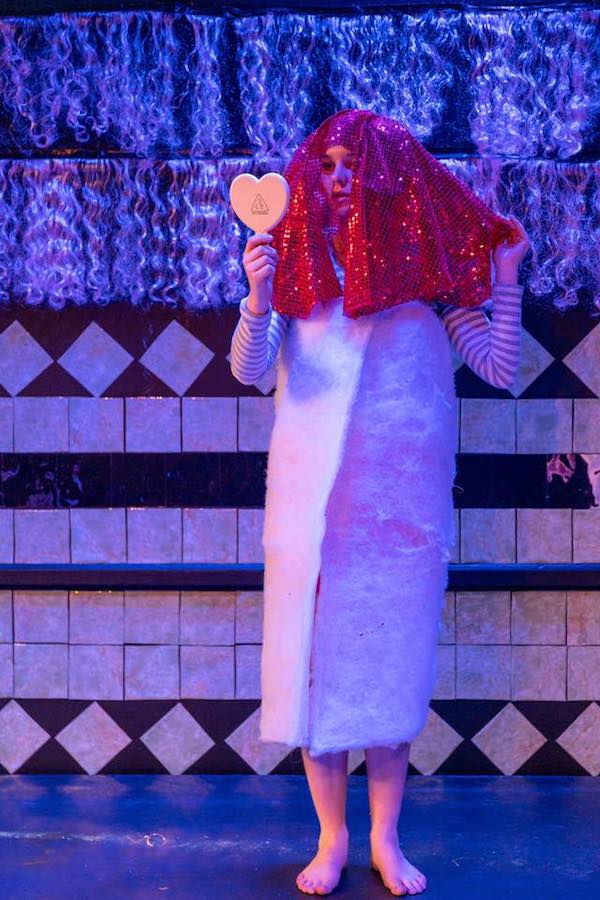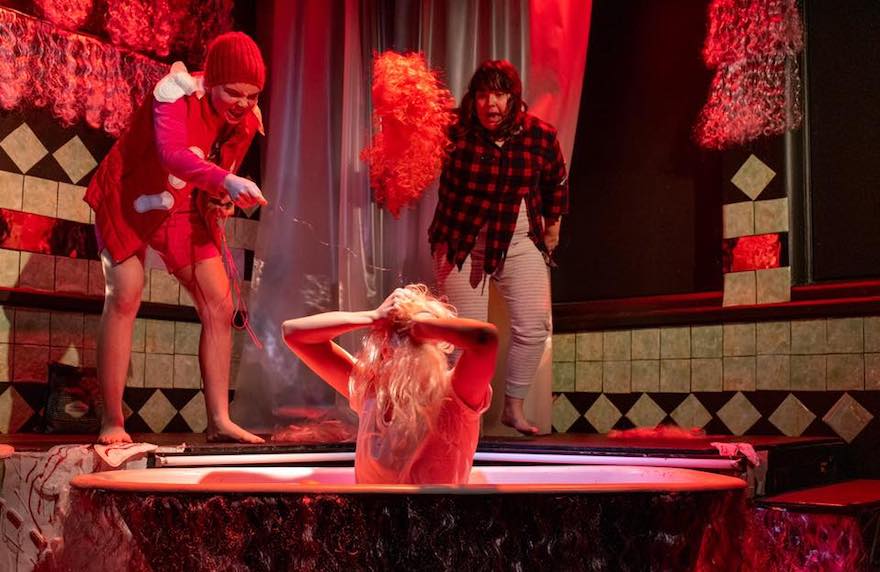Review: Michelle Aitken, Unrule ·
The Blue Room Theatre, 30 May ·
Review by Claire Trolio ·
It’s a great thing when a show comes along that is acutely relevant to your personal taste or interests. A feminist consideration of the female body using comedy and horror devices? Sign me up!
It’s even better when that show delivers insightful, relatable, thought-provoking and jovial entertainment. Thursday night’s premiere of Unrule did just that.
Created and directed by Michelle Aitken, and devised/performed by Chelsea Gibson, Mani Mae Gomes, Alicia Osyka and Rhiannon Petersen, Unrule mixes recorded and spoken stories with short vignettes that explore experienced body horrors.

The horror genre has long been linked with the body and its mysteries. The theme of adolescent transformation is a popular trope within that genre, and films like Carrie (1976) and Teen Wolf (1985) – both of which are referenced in Unrule – are just two of many examples. It’s the parallels between the bodily changes of adolescence, and those played out through the supernatural, that make this theme a popular one.
And it’s not just the adolescent body that’s ubiquitous in the horror genre. The Cartesian separation of mind and body reigns supreme in such texts, and – no surprises – it’s a gendered binary. The female body is often represented as the site of something sinister; the feminine is linked with weakness, unpredictability, evil… in opposition to the rational, in control masculine. As a result, female characters in horror narratives are often treated with distrust and apprehension. Women are frequently seen succumbing to temptation, in thrall to their bodies rather than their minds. Sexually active women are often punished by the text or presented as villains. Such narratives are a manifestation of men’s lack of understanding, a fear of the unknown and, importantly, a desire to control.
Unrule interrogates these horror devices in various ways. It’s the women who control the story here, by performing, creating and sharing both metaphorical and literal stories involving abject horror. The performers explicitly criticise the separation of mind and body in patriarchal discourse. They admit that bodies are unpredictable, and that humans experience their own physical horrors, whilst arguing that – too often – the medical profession ignores women’s concerns and patronises female patients.
Unrule covers issues of bladder leakage, endometriosis, giving birth, breastfeeding, menstruation and more. Playing with intertextuality, wigs – representing unruly body hair – come alive à la the Gremlins (1984) or Critters (1986) franchises; an attack of flying sanitary pads references The Birds (1963). Being a woman is hard, it admits, but don’t pity us. Unrule asks that women be listened to and respected: it’s that simple.

Olivia Tartaglia’s elaborate set design is an integral part of the message. With a DIY, crafted feel, it is as raw and emotive as the performance itself. Covered in sanitary pads and allusions to menstrual blood, with the aforementioned synthetic wigs, and bathroom elements that reference Psycho (1960) and Carrie (1976), Tartaglia’s set complements and carries the performance.
One of the most enjoyable aspects of this show – and I am reminded of Charlotte Otton’s 2018 work Let Me Finish – is the sense of inclusivity and an optimism that comes with not being alone. Whilst Unrule concedes that interpretive dance murder will not beat the patriarchy, being in the audience of a show like this engenders a feeling of progress. It’s conveyed not just through the subject matter and delivery, but via the intimate seating arrangement and shared snacks. You are made to feel a part of the fight, and it feels good.
Aitken, Petersen, Osyka, Gomes and Gibson have made a raw and honest work. Though a little green and underdeveloped (yes, it could be tighter), Unrule is a funny and heartwarming show that’s a treat to watch.
Pictured top are Alicia Osyka, Mani Mae Gomes and Rhiannon Petersen. Photo: Susie Blatchford, Pixel Poetry.
Like what you're reading? Support Seesaw.





